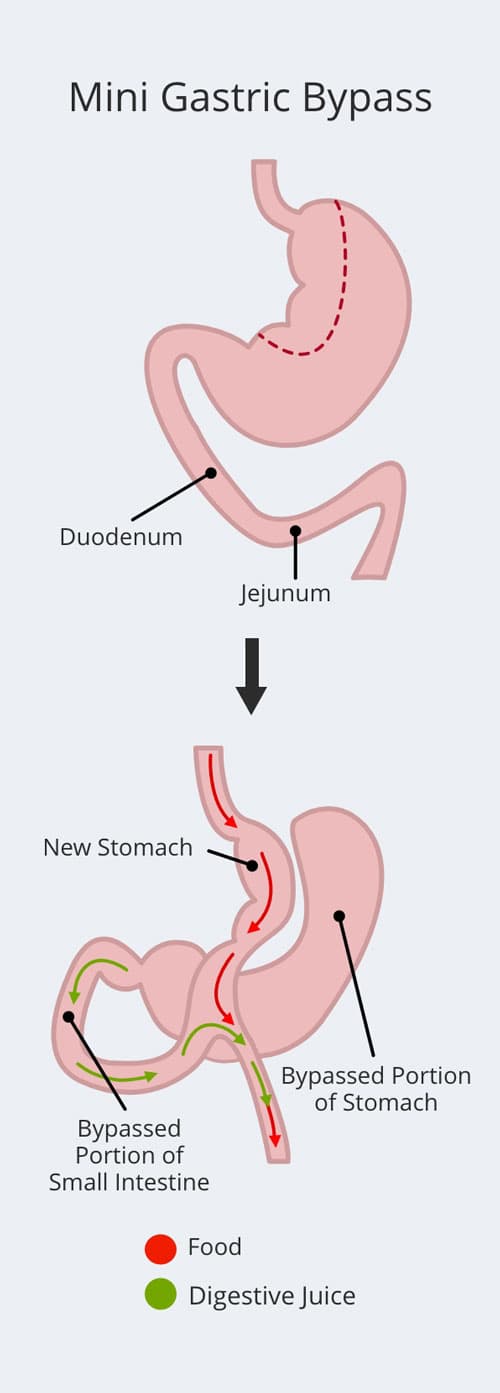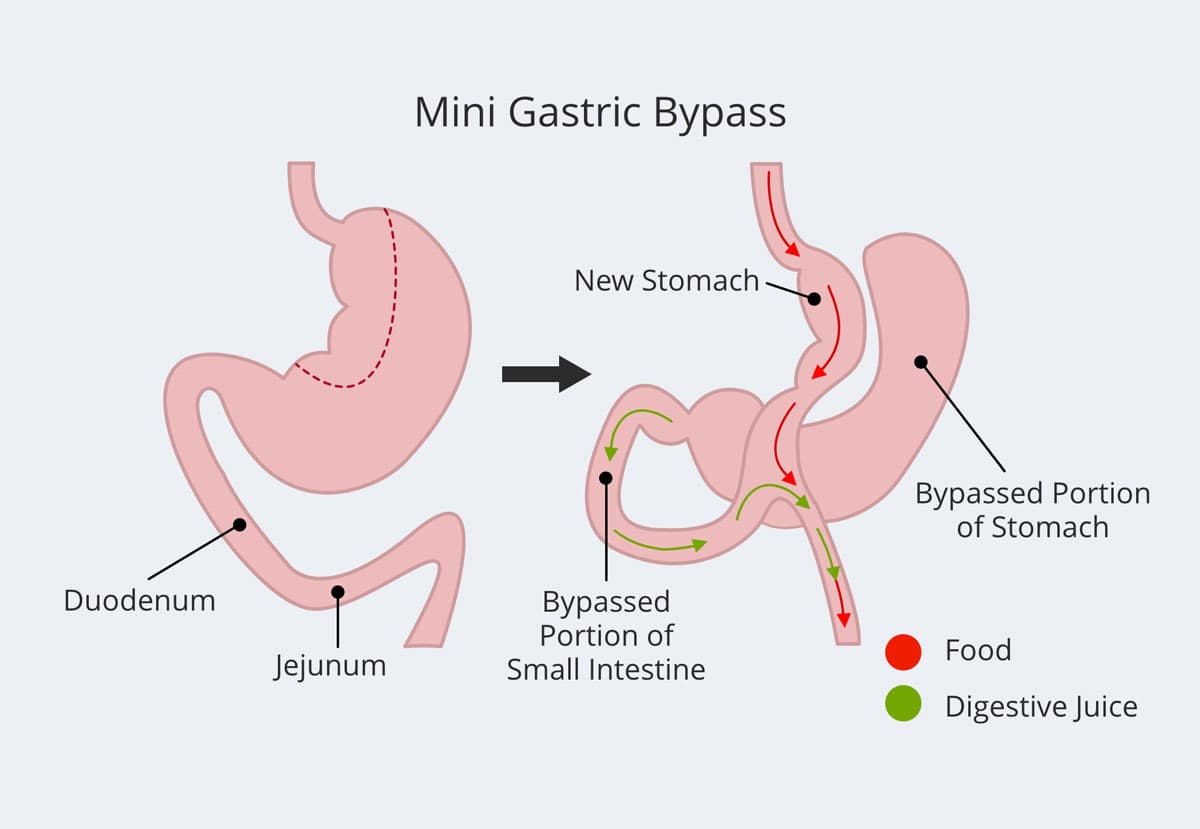Ozempic® vs Bariatric Surgery: Which Is Right for You?
If you are finding it difficult to lose significant weight on your own and considering bariatric… Read On
SmartShape Weight Loss Centre
1599 Hurontario St, #302
Mississauga, ON L5G 4S1
Phone: (888) 278-7952
Monday–Friday: 9 a.m.–5 p.m.
SmartShape™ Weight Loss Centre offers a modern alternative to the traditional gastric bypass procedure called Mini Gastric Bypass surgery for patients from Toronto, Mississauga, and other Ontario cities, Alberta, Québec, British Columbia, the Atlantic Provinces (Newfoundland, New Brunswick, Prince Edward Island, and Nova Scotia), and throughout Canada.
The Mini Gastric Bypass (MGB), also known as a one anastomosis gastric bypass (OAGB), is performed laparoscopically at our Clearpoint Surgical Toronto. The surgery takes about 60 to 90 minutes to complete. It’s a two-part procedure that involves:
After surgery, the majority of the stomach and approximately one-third of the small intestine is “bypassed”—which means they are no longer involved in the digestion or absorption of the food you eat.
Once the surgery is complete, you will be monitored overnight in our facility and discharged the next day.


The Mini Gastric Bypass procedure helps you achieve lasting weight loss in two ways:
The Mini Gastric Bypass procedure, developed in 1997, is a simplified version of the traditional procedure that involves one anastomosis (join) of the intestine to the stomach instead of two. Advantages include:
For these reasons, the Mini Gastric Bypass is gaining popularity as the modern alternative to gastric bypass.
On average, patients who have the Mini Gastric Bypass procedure lose up to 75% of their excess weight—most of which occurs in the first year. Other benefits of MGB or OAGB bariatric surgery include:
With the support and encouragement of our SmartShape weight loss coaches, you can successfully set and achieve your goals, both on and off the scale.
The cost of weight loss surgery at SmartShape in Toronto varies between patients and procedures. Please visit our Procedure Cost page and review this blog post to learn more.
Are you ready to live your best life? Weight loss surgery could be the right choice for you if you:
At SmartShape Weight Loss Centre, we also offer Gastric Sleeve weight loss surgery. During your consultation, your surgeon will discuss your weight loss surgery options with you.
SmartShape welcomes out-of-town patients from other provinces and outside of Canada for Mini Gastric Bypass and other weight loss surgery.
In consideration of our out-of-province and international patients, we have adapted our follow-up programs to limit the need to travel.
Mini Gastric Bypass surgery reduces food intake and limits calorie absorption. The size of the stomach is reduced, so it fills faster than before surgery, causing patients to eat less. This procedure also reroutes the digestive system around a portion of the small intestine, reducing calorie absorption.
Gastric Sleeve surgery reduces the stomach to a small sleeve that fills quickly, making patients feel full with smaller portions of food. The surgery removes the main portion of the stomach that produces the hunger hormone (ghrelin), helping patients go longer between meals.
For more information about SmartShape Weight Loss Centre and weight loss surgery, visit our FAQs page.
I have struggled with my weight my entire life. I was overweight as a child and never really grew out of it. I was always the "chubby girl" in school and carried this into high school and university. I lost weight before starting post-secondary school through intense calorie restriction and exercise but unfortunately packed it all back on (and more!) with the stress of studying… Read On
You should be ready to return to work and regular light activity within about 10 days but must delay strenuous activity for about 3 to 4 weeks.
You will need to stay overnight in the hospital after Mini Gastric Bypass surgery before returning home. We provide 24/7 after-hours support and a follow-up consultation with your surgeon as needed. Here is a general schedule for post-op care:
After your weight loss, you’ll feel healthier and more confident. Removing loose skin with body contouring surgery can take your confidence to the next level! Post-weight loss body contouring surgery removes excess skin on the arms, legs, abdomen, and breasts to help you fully enjoy your new, slimmer shape. Learn how we can help.
Elevate Your ShapeWhen the procedure is being performed by a qualified bariatric surgeon on a carefully screened patient at an accredited medical facility, Mini Gastric Bypass surgery is very safe. At SmartShape Weight Loss Centre, we have a team of fully qualified surgeons who have performed bariatric surgery procedures on over 7,000 patients.
For safety and success after Mini Gastric Bypass surgery, you must commit to certain changes in your lifestyle and eating habits. Potential drawbacks of Mini Gastric Bypass surgery include:
The Mini Gastric Bypass procedure is performed laparoscopically using small incisions. This low-risk, minimally invasive technique has many benefits over open surgery, including:
During the first week after the procedure, expect to feel some pain. The discomfort is usually restricted to the laparoscopic port sites and can be managed with oral pain medication. You may also experience mild “gas pain” that settles in a couple of days. Your doctor will give you instructions regarding pain management.
Following the procedure, you will be on a liquid-only diet. After a few days, you will be ready to begin trying some thicker liquids. The SmartShape team will explain when and how to transition your diet during the first few weeks. You will likely be ready for solid food 3 to 4 weeks after your procedure. It is important to follow the diet you have been provided and not rush the process of increasing your food intake.
The average SmartShape Mini Gastric Bypass patient loses up to 75% of their excess weight, most of which is shed within the first year. The success of your surgery depends on your commitment to consistent exercise and healthy eating, all supported by our 5-Year AfterCare Success Program.
There is no “best” weight loss procedure for all patients. If you are a good candidate for surgery, one of our bariatric surgeons can help you decide which one works best for you by considering your weight, medical history, age, and other factors.
We recommend you start walking up to 30 minutes per day as soon as you are able. Strenuous exercise is not recommended until 3 to 4 weeks after surgery. We recommend that you do not lift more than 10 to 15 pounds for at least 2 weeks.
Avoid overdoing it (physically and emotionally) and straying from your prescribed diet to minimize the possibility of complications or setbacks in your recovery. You will be given specific post-op instructions to follow closely after surgery.
OHIP covers weight loss surgery for people who meet certain criteria. Qualified patients that use OHIP coverage are not given a choice of procedure; they usually receive gastric bypass surgery. Learn more in this blog post.
Although the Mini Gastric Bypass procedure should be considered permanent, it can be reversed with another surgical procedure. Revision surgery is very uncommon and typically leads to weight regain; however, reversal is possible. A Mini Gastric Bypass is different from the traditional gastric bypass, which is very difficult, if not impossible, to reverse.
While weight gain is common after weight loss through dieting alone, most patients experience long-term weight loss after Mini Gastric Bypass surgery.
Bariatric surgery has emerged as an innovative alternative option in the management of type 2 diabetes. Many 5-year studies show that the Mini Gastric Bypass, as well as other bariatric surgeries, leads to a profound and durable resolution of type 2 diabetes.
Bariatric surgery procedures can result in sustained body weight loss and significant improvement in obesity-related comorbidities. Surgical weight loss procedures are recognized by Diabetes Canada to lead to significant and sustained weight loss and remission of Type 2 diabetes.
The Mini Gastric Bypass procedure often leads to more rapid remission of type 2 diabetes due to hormonal changes that occur as a result of food not passing through the first part of the small bowel. For this reason, SmartShape surgeons may suggest the Mini Gastric Bypass procedure if you have type 2 diabetes.
The success of this procedure depends on your age, underlying health status, and your commitment to eating right and exercising consistently. Our team is ready to support you!
After the Mini Gastric Bypass, it will be necessary for you to take some specially chosen supplements on a daily basis. These supplements will ensure that you do not become deficient in some important nutrients such as iron, calcium, and some B vitamins.
Yes, it is safe to become pregnant after receiving the Mini Gastric Bypass procedure, although it is wise to wait a number of months. In addition, losing weight improves your fertility and makes pregnancy safer for both you and your baby.
After the surgery, you will need to follow a diet that begins with liquids, introduces thicker liquids after a few days, and arrives at solid foods in about 3 to 4 weeks. Nutrition and small portions are key every step of the way. You will be provided with specifics as part of your aftercare program.
We encourage you to book a free consultation using our online form to discuss your specific needs and address any questions you may have, so you can find out if the Mini Gastric Bypass is a good choice for you.